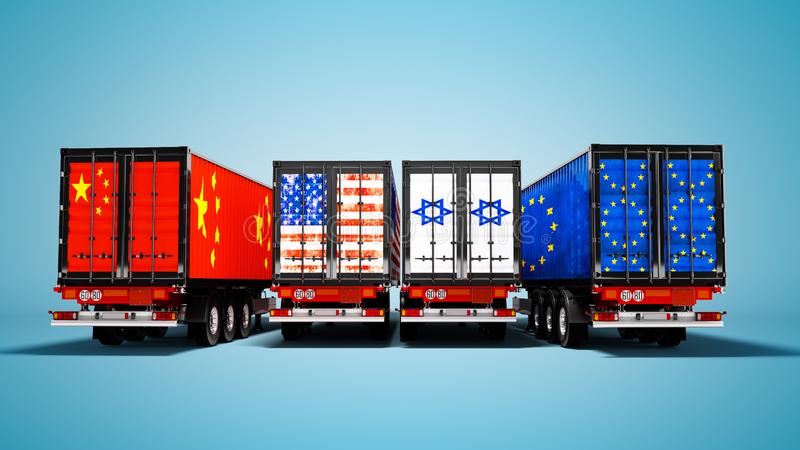Exploring the Steps Involved in Importing Trailers From South Africa
Exploring the Steps Involved in Importing Trailers From South Africa
Imports are one of the easiest ways to drive down the price of a product and increase your company’s profits. This is especially true when you’re importing from South Africa. The country is well known for its low manufacturing costs and high-quality products, which makes it an ideal place to import goods from. In this post, we’ll explore what it takes to import trailers from South Africa into the United States. Keep reading to learn more about this process, including the steps involved, COGS costs, tariffs, shipping costs, and more. If you’re interested in learning more about importing trailers from South Africa or want to know how much it will cost your company, this blog post has everything you need to know.
What is the Import Process for Trailers?
Importing, in general, involves the following five steps: The first step, produce and test run your product, refers to the manufacturing and quality assurance process for your trailers. When importing from South Africa, it’s important to make sure your trailers meet U.S. safety standards. This means you’ll need to hire a third-party inspection company to certify your product, and make any necessary adjustments. The next step, find a reputable shipper, refers to your shipping company. When importing from South Africa, you’ll want to find a shipper with an excellent reputation. This way, you can protect your brand and ensure your product arrives safely. This is an especially important step when importing trailers. A shipper with an impeccable reputation can help you avoid paying unnecessary fees and ensure your products arrive on time. The third step, determine the customs broker fees, refers to how much money you’ll need to pay your customs broker. A customs broker helps you navigate the import process and handle the necessary paperwork. In some cases, they charge a fee for this service. It’s important to know how much this will cost you, so you can factor it into your budgets. The fourth step, estimate shipping costs, refers to your shipping costs. When importing from South Africa, it’s important to account for shipping costs. This amount varies depending on your shipping company, the port, and your destination. The fifth step, determine your COGS, refers to calculating your product’s COGS (cost of goods sold). When importing trailers from South Africa, you’ll need to know the COGS to calculate your profits. You can use the COGS to determine your profit margins and buy your trailers at the right price.
Step 1: Produce and Test Run your Product
When importing trailers from South Africa, it’s important to make sure they meet U.S. safety standards. You can hire a third-party inspection company to certify your product. This will cost you a few hundred dollars but is well worth the expense. This will ensure your trailers meet safety standards and can be imported into the United States without any problems. It’s also important to make sure your trailers are built using high-quality materials and are designed to last. This will help you save money in the long run and protect your brand. If your trailers are built with quality materials and have a long life span, you can resell them for a profit after a few years.
Step 2: Find a Reputable Shipper
When importing trailers from South Africa, you’ll want to find a reputable shipper with an excellent reputation. This way, you can protect your brand and ensure your product arrives safely. Finding a reliable shipper is important when importing trailers, especially since these large items need to be shipped overseas. You can find a shipper through online marketplaces like Freightos or Shippo. These online marketplaces connect you with a variety of shipping companies. You can select the shipper that best suits your needs and has an excellent reputation.
Step 3: Determine the Customs Broker Fees
When importing trailers from South Africa, you’ll want to determine the customs broker fees. A customs broker helps you navigate the import process and handle the necessary paperwork. In some cases, they charge a fee for this service. It’s important to know how much this will cost you, so you can factor it into your budgets. The amount varies depending on the type of product you’re importing and where you’re importing it from. You can find the customs broker fees on the Federal Customs and Border Protection website.
Step 4: Estimate Shipping Costs
When importing trailers from South Africa, it’s important to account for shipping costs. These vary depending on your shipping company, the port, and your destination. To get an estimate, use a shipping calculator like Freightos’ shipping calculator. You can input the specifics of your trailer shipment, including the weight and dimensions, to get an estimated shipping cost.
Step 5: Determining Your COGS
When importing trailers from South Africa, you need to know the COGS (cost of goods sold). This will help you calculate your profit margins and buy your trailers at the right price. To determine your COGS, you’ll need to know the following: – The cost of your raw materials – The cost of your labor – The cost of your shipping – The cost of your overhead Okay, so those last two might sound a little vague. We’ll go into detail below.
Final Words
Importing trailers from South Africa is a great way to drive down your company’s costs and increase your profits. It’s important to follow the five steps outlined above to import trailers successfully. When importing trailers, it’s important to note that it can take anywhere from two to six months to complete the process. For an accurate timeline, you can use this import guide. If you are interested in importing trailers from South Africa, contact a logistics company today and get started.








LEAVE A COMMENT
You must be logged in to post a comment.